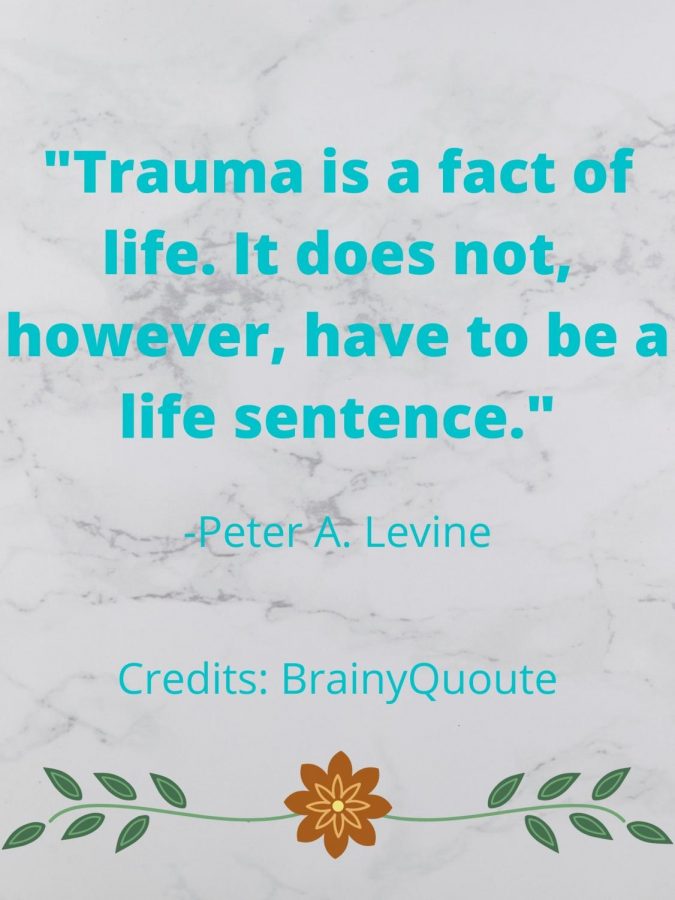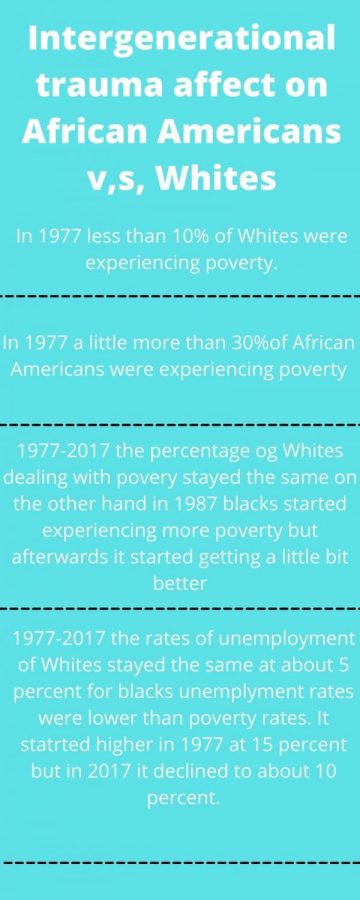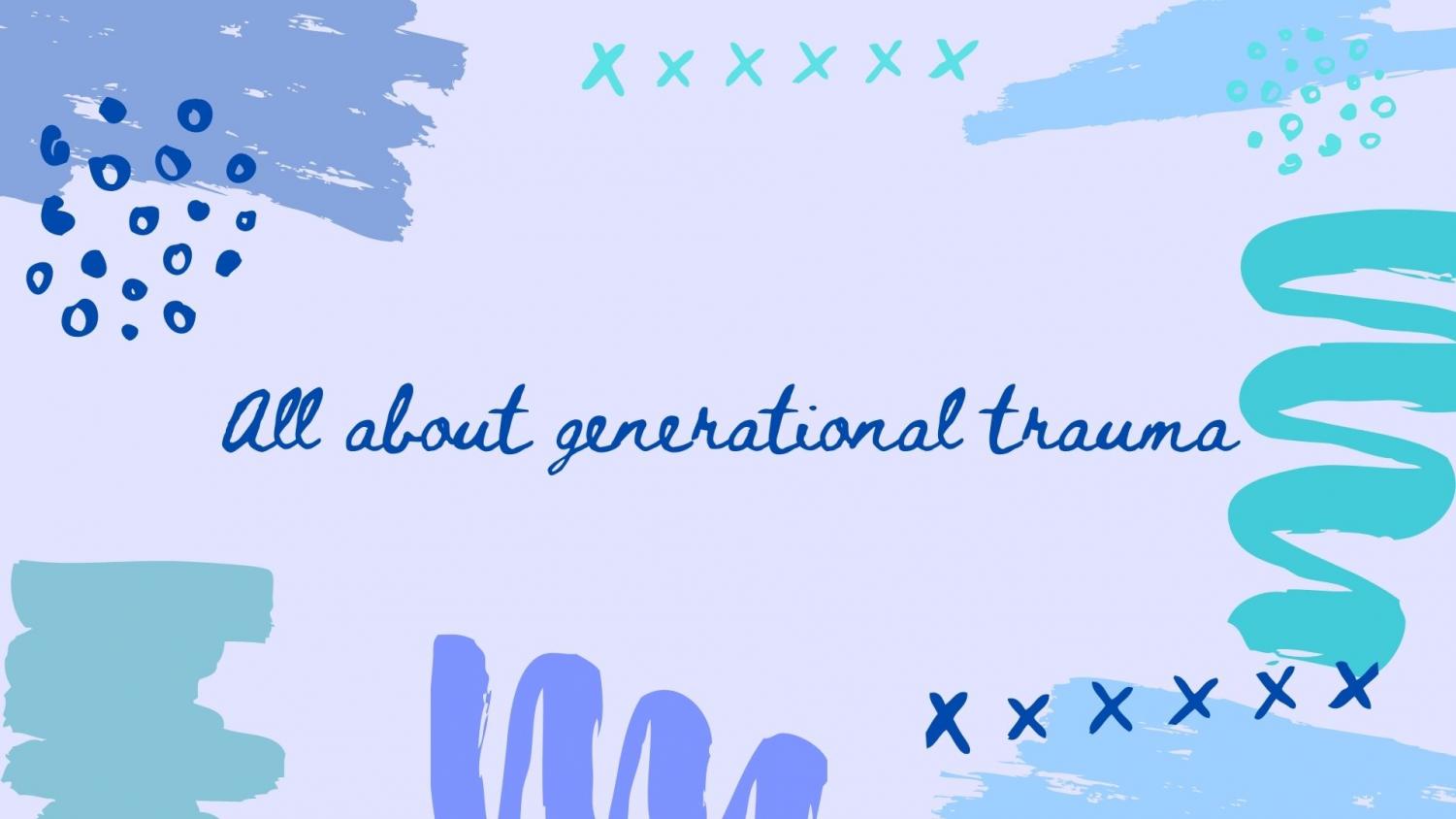All about generational trauma
April 22, 2021
50 to 70 percent of people experience a major traumatic event once in their lives. A generation lasts for about 25-30 years. Maturity and age rarely affects when or how the trauma takes place, but it does affect each individual’s reaction to it. When younger, children might not interpret the trauma that took or takes place until they grow-up. Trauma can take place generationally, meaning that it can transfer between generations. It can start by the parents using substances, their mental health disorders, or any type of violence in the home. This trauma experienced in the home impacts how children do numerous things such as how they react to and heal from any future trauma or day to day experiences.
Different types of generational trauma include transgenerational and intergenerational. Transgenerational and intergenerational trauma showcase multiple similarities and differences. Transgenerational means acting across multiple generations while intergenerational means between or across generations. Like transgenerational trauma goes on throughout generations without a break; while intergenerational breaks like when the trauma does not affect some people in a certain generation. They both occur due to traumas that take place in people’s lives and continuously pass down through generations. One of the causes of transgenerational trauma includes any type of abuse that could cause anxiety among generations. Intergenerational can begin because of experiences such as losing a loved one unexpectedly or by lacking enough money to do everyday things. The stress from the trauma affects the environment which affects the people living in it. The stress can lead to children developing problems with their learning or developing learning disorders such as ADHD.

“I have gone through numerous things that have caused trauma in my life because of generational trauma that my mother went through whenever she was younger. Things like not being close to loved ones has caused stress for both of us, which affects my two brothers and I in multiple ways,” said NC freshman Ryan Vickers
Generational trauma comes with the ability to hurt anybody, especially families. When a member of the family acts emotionally, desensible and anxious to communicate with their family members, that usually means that they still experience generational trauma daily. Families feel scared to open up because they feel weak or because of distrust in various people in the family., which can cause even more conflict between the members which leads to even more trauma. It can force the people who deal with the same struggles to dislike each other by putting stress on the relationship, which could break the foundation of multiple key relationships. This tends to end poorly for the person or people going through the trauma. A number of symptoms that indicate someone experiencing generational trauma include depression and anxiety, other symptoms include panic attacks, lack of self confidence, and lastly a low self esteem.
Just like any type of trauma, it can heal with different types of therapy. Such as play therapy, parent-children therapy, and family therapy. Play therapy specifically helps children communicate, show their emotions, and solve problems. This type of therapy uses things like storytelling, music, dance, and arts and crafts. It includes different types of parent-child and family therapy like parent-child interaction, child parent relationship, family play therapy, and family systems. Individuals can also heal by filling out a genogram. A genogram comes with a picture of somebody’s family tree. So the clients of the therapist can view patterns and factors that affect their relationships.
“I have had to go to therapy for trauma but specifically generational trauma. It helped me get through all of the ups and downs that the trauma threw my way. Which helped me in many ways in the long run,” said NC freshman William Summerlin.
Trauma recently increased all around the world because of COVID-19. People now view things like the capitol riots and natural disasters as worse than usual due to the pandemic. The pandemic caused and continues to cause huge amounts of collective trauma, trauma that people share through experiencing the same event such as the pandemic. Collective trauma can show up as immediate or less immediate depending on what causes the commotion. It ends up with different impacts than other types of trauma. It can lead to the feeling of humiliation and feeling more vulnerable than usual. This type leads to generational trauma for the individuals in the future. It does not only impact us now because of COVID. It has affected a number of people in the past, such as African Americans because of slavery. Slavery, one of the numerous events that still impacts people to this day, causes African Americans of this generation to deal with higher rates of poverty and unemployment compared to other races. Slavery also led African Americans of today to poor social, physical, and emotional health. It does not only affect individuals, it also affects the culture of African Americans in negative ways.
“Every generation can find a legitimate reason to be traumatized by something done by the generation before. Each generation only sees what happened to them, without any awareness of what was done to the generation before them, or the one before that. Sadly, they also fail to realize what happened to them is causing them to do to the ones who come next. However, once we try to truly understand what happened in the past instead of judging it, we realize all of us are just doing the best we can to make the best of a bad situation. That opens the door for compassion. Compassion leads to forgiveness and healing, which ultimately leads to us being able to learn from the past and break the cycle of brokenness,” said NC counselor Mr. Deane

Generational trauma can also pass down genetically and behaviorally. It gets passed through behaviorally since children tend to copy what they see others, like their parents and siblings, doing. For example if children see somebody hitting someone the child might mirror that behavior and hit someone at school, ending up getting in trouble. Trauma goes through generations genetically because, according to recent research, experiencing something very traumatic can actually alter one’s DNA. The genetic change can continue to go through three generations.
“There has been some trauma going on throughout my family for two generations now, me being the third. It has affected me and the generations before me in the same way but we have all healed from it from going to things like therapy and having family meetings a couple times a week to help talk about what has been going on so we can vent,” NC senior Gideon Anthis said.
Recently due to COVID-19 a numerous amount of trauma took place and continues to, unfortunately psychologists predict it will become generational trauma and affect others in the future, like the newborns that came into this world this year. COVID started to cause trauma physically and psychologically by making people lose jobs, worry about themselves and loved ones, and the stress that the virus continues to create for everyone. People, especially students, of this generation deal with even more trauma due to online school and having to handle the COVID-19 rules. Multiple student’s grades decreased because of online school causing more stress for students and teachers. Individuals found lots of ways to heal from all the trauma caused by the pandemic including any type of therapy, meditation, yoga, doing things like exercise, and keeping a healthy eating and sleeping schedule.
“To be honest, how I usually deal with COVID’s trauma is trying to gain attention into some sort of hobby like drawing or painting to keep myself busy. Since the trauma hurts not only me, but others, getting into a hobby with friends can help all of us distract ourselves. Overall, it’s just something that I try to keep off my mind until I truly need to speak about it,” NC sophomore Zaire Breedlove said.

